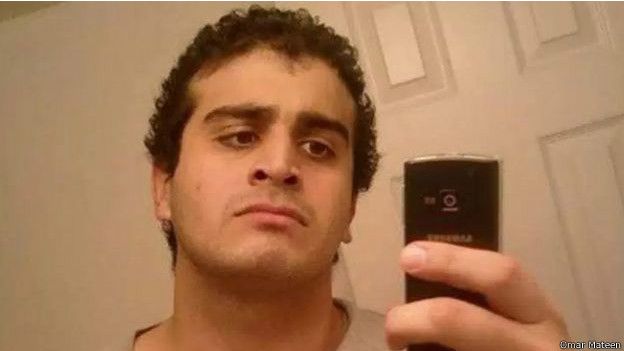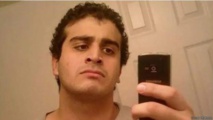Mateen, a 29-year-old American of Afghan descent, died in a gunfight with police after the shooting rampage early Sunday at Orlando's Pulse nightclub that left 49 dead.
He pledged allegiance to IS during the attack -- albeit in a jumbled 911 message in which he also vowed support for the Al-Nusra Front, which is battling IS in Syria.
The Orlando attack came six months after the mass shooting in San Bernardino, California, where a man and wife opened fire on a Christmas party killing 14 people. The radicalized Muslim couple are believed to have been inspired, if not directed, by the Islamic State group.
Democratic White House hopeful Hillary Clinton vowed Monday to set up a team dedicated to detecting and preventing "lone-wolf" attacks.
But experts said the killings in Orlando and San Bernardino raise tough questions about privacy and security, and show just how hard it is to stop radicals who act alone.
The FBI admits it previously investigated the 29-year-old Mateen after he made inflammatory comments to co-workers -- but cleared him of extremist ties.
FBI chief James Comey vowed Monday to "look hard at our own work" to see whether there is something agents should have done differently.
"So far, the honest answer is, I don't think so."
- 'Free society' -
Steve Pomerantz, a former assistant director and counterterrorism chief for the FBI, said the agency likely has interviewed "thousands" of people who visit extremist websites or have raised other red flags. But such behavior is not necessarily illegal.
"As long as I don't cross the line of fundraising for them or recruiting for them, it's not against the law, so what do you do about that? Do you wiretap that guy, and if so for how long? Do you follow him? The amount of manpower it would take to do that is beyond the realm of reality," Pomerantz told AFP.
"Unless they've actually gone over that line, there are a limited number of things in a free society that you can do about that," he added.
Mateen's case is a potent illustration.
The FBI first became aware of him in May 2013 when he was flagged for making comments to colleagues that suggested terror ties.
"We attempted to determine whether he was a possible terrorist, something we do in hundreds of cases all across the country," Comey told a news conference.
The FBI's Miami office opened a preliminary investigation: introducing sources to him, recording conversations with him, following him, reviewing his communication records, and searching government files.
Interviewed twice, Mateen told agents he made the incendiary comments in anger because he thought his co-workers were teasing him as a Muslim. After 10 months, the investigation was closed.
Agents questioned him again the following year over his connection to Moner Mohammad Abusalha, a fellow Floridian who conducted a suicide bombing in Syria.
The two attended the same mosque but again, the probe turned up no ties of any consequence, Comey said.
- 'Increasing number' of attacks -
Clinton trained her fire on the ready availability of assault weapons, which compounds the threat from radicalized individuals, saying: "It's essential that we stop terrorists from getting the tools they need to carry out the attack."
Mateen legally purchased the weapons used in the Orlando attack, even though he was once included on a terror screening database.
In light of the challenges of identifying and stopping "lone wolves," observers say responsibility for thwarting them starts with the people who know them.
"For a large majority of offenders in mass-casualty and active-threat situations, others were aware of the grievances that later turned into terrorist plots or active shooting situations," said Michael Masters, senior vice president at the New York-based Soufan Group intelligence consultancy.
Local cops need to boost outreach to local communities and filter reports of suspicious activity up to state and federal authorities, he suggests.
"Unfortunately, I think we are going to see an increasing number of these (attacks), which is why that emphasis on trying to identify individuals and take proactive stances against them is going to be particularly critical at the next stage," Masters told AFP.
Republican White House hopeful Donald Trump has made a similar point -- but alarmed critics by singling out the Muslim community, accusing it of failing to report potential terrorists in its midst.
Comey noted that the FBI has had positive interactions with many Muslim communities.
"Some our most productive relationships are with people who see things, and tell us things, who happened to be Muslims," he said.
"It's at the heart of the FBI effectiveness to have good relationships with those folks."
------------------------------------------------------------------------------------------------------------------------
He pledged allegiance to IS during the attack -- albeit in a jumbled 911 message in which he also vowed support for the Al-Nusra Front, which is battling IS in Syria.
The Orlando attack came six months after the mass shooting in San Bernardino, California, where a man and wife opened fire on a Christmas party killing 14 people. The radicalized Muslim couple are believed to have been inspired, if not directed, by the Islamic State group.
Democratic White House hopeful Hillary Clinton vowed Monday to set up a team dedicated to detecting and preventing "lone-wolf" attacks.
But experts said the killings in Orlando and San Bernardino raise tough questions about privacy and security, and show just how hard it is to stop radicals who act alone.
The FBI admits it previously investigated the 29-year-old Mateen after he made inflammatory comments to co-workers -- but cleared him of extremist ties.
FBI chief James Comey vowed Monday to "look hard at our own work" to see whether there is something agents should have done differently.
"So far, the honest answer is, I don't think so."
- 'Free society' -
Steve Pomerantz, a former assistant director and counterterrorism chief for the FBI, said the agency likely has interviewed "thousands" of people who visit extremist websites or have raised other red flags. But such behavior is not necessarily illegal.
"As long as I don't cross the line of fundraising for them or recruiting for them, it's not against the law, so what do you do about that? Do you wiretap that guy, and if so for how long? Do you follow him? The amount of manpower it would take to do that is beyond the realm of reality," Pomerantz told AFP.
"Unless they've actually gone over that line, there are a limited number of things in a free society that you can do about that," he added.
Mateen's case is a potent illustration.
The FBI first became aware of him in May 2013 when he was flagged for making comments to colleagues that suggested terror ties.
"We attempted to determine whether he was a possible terrorist, something we do in hundreds of cases all across the country," Comey told a news conference.
The FBI's Miami office opened a preliminary investigation: introducing sources to him, recording conversations with him, following him, reviewing his communication records, and searching government files.
Interviewed twice, Mateen told agents he made the incendiary comments in anger because he thought his co-workers were teasing him as a Muslim. After 10 months, the investigation was closed.
Agents questioned him again the following year over his connection to Moner Mohammad Abusalha, a fellow Floridian who conducted a suicide bombing in Syria.
The two attended the same mosque but again, the probe turned up no ties of any consequence, Comey said.
- 'Increasing number' of attacks -
Clinton trained her fire on the ready availability of assault weapons, which compounds the threat from radicalized individuals, saying: "It's essential that we stop terrorists from getting the tools they need to carry out the attack."
Mateen legally purchased the weapons used in the Orlando attack, even though he was once included on a terror screening database.
In light of the challenges of identifying and stopping "lone wolves," observers say responsibility for thwarting them starts with the people who know them.
"For a large majority of offenders in mass-casualty and active-threat situations, others were aware of the grievances that later turned into terrorist plots or active shooting situations," said Michael Masters, senior vice president at the New York-based Soufan Group intelligence consultancy.
Local cops need to boost outreach to local communities and filter reports of suspicious activity up to state and federal authorities, he suggests.
"Unfortunately, I think we are going to see an increasing number of these (attacks), which is why that emphasis on trying to identify individuals and take proactive stances against them is going to be particularly critical at the next stage," Masters told AFP.
Republican White House hopeful Donald Trump has made a similar point -- but alarmed critics by singling out the Muslim community, accusing it of failing to report potential terrorists in its midst.
Comey noted that the FBI has had positive interactions with many Muslim communities.
"Some our most productive relationships are with people who see things, and tell us things, who happened to be Muslims," he said.
"It's at the heart of the FBI effectiveness to have good relationships with those folks."
------------------------------------------------------------------------------------------------------------------------









 Home
Home Politics
Politics











